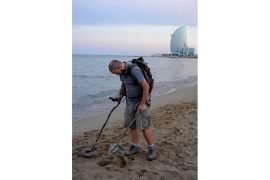Until you become an expert driver, you have to realise...

Lung cancer with tumors that present a specific epigenetic mark,...

There is no need, anymore, to go to Silicon Valley...

The textile company that designs, manufactures and markets accessories for...

The Port of Barcelona is the city’s economic driving force...
Everything seems to indicate that agriculture and cattle-raising stand on...

In Barcelona there are four or five people who spread...

The Yes! Programme of the SHE Foundation, a school intervention...

Apparently, what we thought was science fiction is beginning to...

Producing and marketing homes within demand-based pricing will continue to...

Música clásica sobre la arena de la playa en dos...

The first session of the cycle on the regatta organized...

The hospital's managing director, Manel del Castillo, and the pharmaceutical...

Generalitat y Ayuntamiento impulsarán dos equipamientos de 'Casa de les...

Leticia Beleta, director of Alexion Pharmaceuticals in Spain and Portugal,...

We all have a friend who never leaves the Gràcia...

Barcelona director opts for Best International Film with 'La sociedad...

The hotel and industrial sectors softened the market's decline last...

The technology company, with a workforce of 35 employees and...

“The women of yesteryear were strong and had to fight...
[dropcap letter=”I”]
started going to school in the fall of 1963 or the winter of 64, when I was five. When I arrived there, the nuns —we had to call them sisters— had drawn a table and a chair on the blackboard and, underneath, some figures. They would point at them and we had to repeat after them T-A-B-L-E and C-H-A-I-R. After that, they asked us to draw more figures. Then, we had to pronounce them. I could not see sense behind all that because I found it useless and tedious. On the third day, I had enough, and refused to go back to school because I didn’t like it and saw no use of it. But my mother disagreed and mercilessly dragged me back to school. Hopelessly, I continued doing the same apparently senseless and absurd activities for a few more days, amidst a tedious monotonousness, “monotony of rain behind the windows”, as a poem by Machado quite accurately describes.
I was a sickly boy and, after a while, I had to spend a few days at home, sick in bed with fever, surrounded by comic strips of my favourite heroes, Capitán Trueno and Jabato. By all means, I knew my beloved cartoons included a sort of balloons full of signs that, I was told, represented what the characters were saying. But since I could not read, I paid no notice. I was content and entertained with the luxurious wealth of the drawings, as I interpreted, as well as I could, the steps of the action. Suddenly, I had a revelation, and this is not a misnomer. I discovered that some of those secret signs looked very much like the ones I had seen in the tedious school sessions. I saw the front page, it should say El Capitán Trueno, and recognised the vowels straightaway. Therefore, the other signs had to be l, c, p, t, n and r. The fact that letters t and n appeared twice in appropriate positions was an added evidence of the goodness of the method. Within the jumble of letters of the cartoon, words like throne and attack became intelligible. I had in my hands the Rossetta stone to decipher the signs of writing. I only needed an exercise of elementary combinatory to work out its meaning.
What happened was that, suddenly, all the adventures of my favourite hero were coming to life. The captain was saying things, formulated purposes, displayed bravado or was happy with the good result of his endeavours. The action happened in the land of kirguissos, a highly exotic scenario in the deep of Asia. Everything was new and indescribably fantastic, an adventure far better than anyone could have ever imagined. I was fascinated, delighted, flabbergast. I started deciphering all that information at an irritating speed, in an attempt to know more and more. I did not stop until I got to the end; then, I started all over again, until I understood it all. When I finished, still highly excited, grabbed another cartoon strip, and another and yet another one. My sick bedroom was no longer a solitary location and, suddenly, my bed had become the most crowded and richest places of wonder on the planet. Everything was throbbing life, unleashed passion and energetic actions, the constant surprises of intrigues, the feverish sound of the word. That day I learned how to read. This was the best treasure I have ever found. A treasure that an unusually benevolent genius had just given to me, the source of life that gave light to everything and had the virtue of never stopping.
We human beings are what we do. We are also what we say, what we think and what we feel. Because saying, thinking and feeling are facts, verbal facts. When we utter words, the words also utter us. We live them and they give us a reason to be. What we are, we are because of the words. On the other hand, everything that is oral can also be transcribed. Writing, after all, is a tool —a technology, in today’s parlance— that enables us to fixate, settle the evanescent rush of words. Everything, absolutely everything that can be said, thought and felt, can be written. This is the way to grant access to everything that has turned into words, if anybody has transcribed it or survived the fate of time. Perhaps this is not everything, but it is to a large an extent. A present for my five years’ anniversary: access to the entire human universe: the knowledge of sciences, knowledge and vast and manifold adventures of human avatars. The lived ones and the imaginary ones —anywhere, anytime— can become a book of short stories, a erudite study, a cartoon strip, a press report, a letter, a pamphlet, a cyberdocument. Like with the scores, as they will never become music until somebody plays them, every text is a budding world calling for our attention, a country that houses the essence of man. Any written word lives whenever we read it. We bring it back to life and make it our own.
Only what is transmitted from one man to another can escape the threats of forgetfulness and death. Even today, writing is the most effective means of transmission we are capable of. We can read the hymns that the Egyptian priests carved in the stone of the pyramids from five thousand years ago, and its mighty feeling of the sacred still moves us; how can we feel the sadness of Gilgamesh on seeing Enkidu dead, and his unsuccessful endeavour —not even at the reach of a hero like him— of being immortal, a complaint, written over four thousand years ago is also ours. Priam’s tears facing her son’s assassin also move us, Odysseus’ craving to go back home, the old view of old Socrates arguing incessantly among sleepy drunkards at the end of the Banquet, Dante’s journey through hell and paradise, or Quixote’s adventures with Sancho through the most incredible places that are more so because they weave the dream of ordinariness, or the strange adventure of a boy who learns to read in a long feverish journey, and to this day is grateful for this never-ending gift. Reading is making the world our own, a festival that lasts forever.
[dropcap letter=”I”]
started going to school in the fall of 1963 or the winter of 64, when I was five. When I arrived there, the nuns —we had to call them sisters— had drawn a table and a chair on the blackboard and, underneath, some figures. They would point at them and we had to repeat after them T-A-B-L-E and C-H-A-I-R. After that, they asked us to draw more figures. Then, we had to pronounce them. I could not see sense behind all that because I found it useless and tedious. On the third day, I had enough, and refused to go back to school because I didn’t like it and saw no use of it. But my mother disagreed and mercilessly dragged me back to school. Hopelessly, I continued doing the same apparently senseless and absurd activities for a few more days, amidst a tedious monotonousness, “monotony of rain behind the windows”, as a poem by Machado quite accurately describes.
I was a sickly boy and, after a while, I had to spend a few days at home, sick in bed with fever, surrounded by comic strips of my favourite heroes, Capitán Trueno and Jabato. By all means, I knew my beloved cartoons included a sort of balloons full of signs that, I was told, represented what the characters were saying. But since I could not read, I paid no notice. I was content and entertained with the luxurious wealth of the drawings, as I interpreted, as well as I could, the steps of the action. Suddenly, I had a revelation, and this is not a misnomer. I discovered that some of those secret signs looked very much like the ones I had seen in the tedious school sessions. I saw the front page, it should say El Capitán Trueno, and recognised the vowels straightaway. Therefore, the other signs had to be l, c, p, t, n and r. The fact that letters t and n appeared twice in appropriate positions was an added evidence of the goodness of the method. Within the jumble of letters of the cartoon, words like throne and attack became intelligible. I had in my hands the Rossetta stone to decipher the signs of writing. I only needed an exercise of elementary combinatory to work out its meaning.
What happened was that, suddenly, all the adventures of my favourite hero were coming to life. The captain was saying things, formulated purposes, displayed bravado or was happy with the good result of his endeavours. The action happened in the land of kirguissos, a highly exotic scenario in the deep of Asia. Everything was new and indescribably fantastic, an adventure far better than anyone could have ever imagined. I was fascinated, delighted, flabbergast. I started deciphering all that information at an irritating speed, in an attempt to know more and more. I did not stop until I got to the end; then, I started all over again, until I understood it all. When I finished, still highly excited, grabbed another cartoon strip, and another and yet another one. My sick bedroom was no longer a solitary location and, suddenly, my bed had become the most crowded and richest places of wonder on the planet. Everything was throbbing life, unleashed passion and energetic actions, the constant surprises of intrigues, the feverish sound of the word. That day I learned how to read. This was the best treasure I have ever found. A treasure that an unusually benevolent genius had just given to me, the source of life that gave light to everything and had the virtue of never stopping.
We human beings are what we do. We are also what we say, what we think and what we feel. Because saying, thinking and feeling are facts, verbal facts. When we utter words, the words also utter us. We live them and they give us a reason to be. What we are, we are because of the words. On the other hand, everything that is oral can also be transcribed. Writing, after all, is a tool —a technology, in today’s parlance— that enables us to fixate, settle the evanescent rush of words. Everything, absolutely everything that can be said, thought and felt, can be written. This is the way to grant access to everything that has turned into words, if anybody has transcribed it or survived the fate of time. Perhaps this is not everything, but it is to a large an extent. A present for my five years’ anniversary: access to the entire human universe: the knowledge of sciences, knowledge and vast and manifold adventures of human avatars. The lived ones and the imaginary ones —anywhere, anytime— can become a book of short stories, a erudite study, a cartoon strip, a press report, a letter, a pamphlet, a cyberdocument. Like with the scores, as they will never become music until somebody plays them, every text is a budding world calling for our attention, a country that houses the essence of man. Any written word lives whenever we read it. We bring it back to life and make it our own.
Only what is transmitted from one man to another can escape the threats of forgetfulness and death. Even today, writing is the most effective means of transmission we are capable of. We can read the hymns that the Egyptian priests carved in the stone of the pyramids from five thousand years ago, and its mighty feeling of the sacred still moves us; how can we feel the sadness of Gilgamesh on seeing Enkidu dead, and his unsuccessful endeavour —not even at the reach of a hero like him— of being immortal, a complaint, written over four thousand years ago is also ours. Priam’s tears facing her son’s assassin also move us, Odysseus’ craving to go back home, the old view of old Socrates arguing incessantly among sleepy drunkards at the end of the Banquet, Dante’s journey through hell and paradise, or Quixote’s adventures with Sancho through the most incredible places that are more so because they weave the dream of ordinariness, or the strange adventure of a boy who learns to read in a long feverish journey, and to this day is grateful for this never-ending gift. Reading is making the world our own, a festival that lasts forever.
